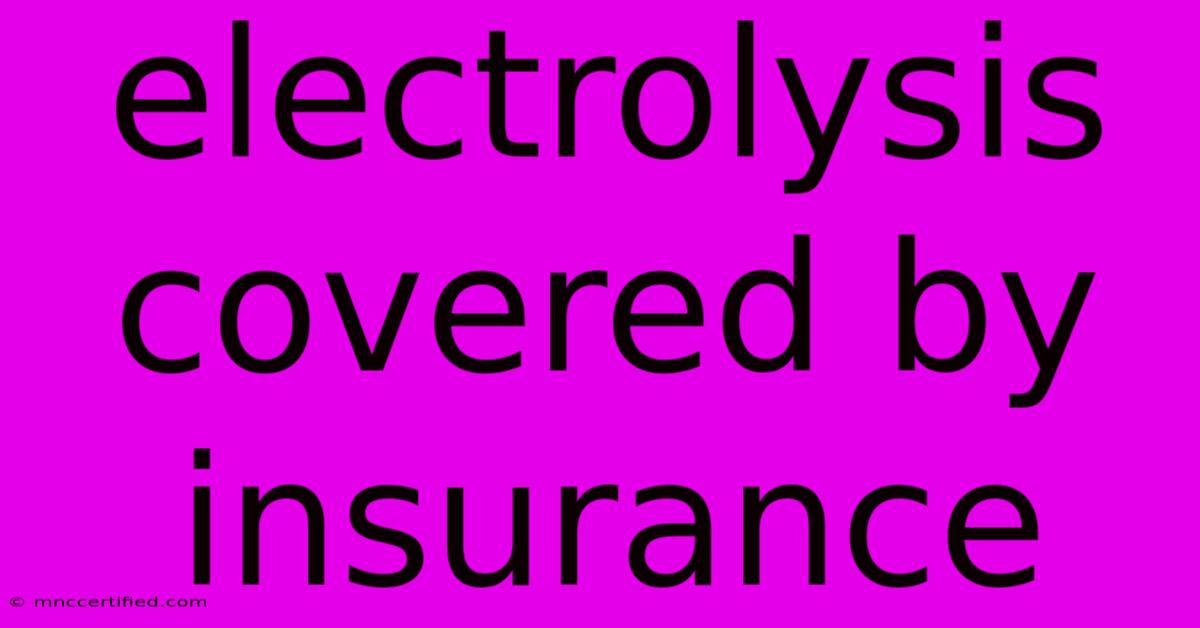Electrolysis Covered By Insurance

Table of Contents
Can Electrolysis Be Covered by Insurance? A Comprehensive Guide
Electrolysis, a permanent hair removal method, can be a significant investment. Many people wonder, "Is electrolysis covered by insurance?" The short answer is: it's complicated. While not commonly covered by major medical insurance providers, there are situations where you might find some or all of the costs covered. This guide will delve into the specifics, helping you navigate the insurance landscape and understand your options.
Understanding Insurance Coverage for Medical Procedures
To understand the likelihood of electrolysis coverage, it's crucial to grasp how insurance companies assess medical necessity. Most insurance plans cover procedures deemed medically necessary to treat or prevent illness or injury. Electrolysis, primarily considered a cosmetic procedure, typically doesn't meet this criterion. This is the primary reason why many insurance companies refuse to cover it.
When Electrolysis Might Be Covered:
There are exceptions. In certain cases, electrolysis can be medically necessary, potentially leading to insurance coverage. These situations include:
- Hypertrichosis: This condition causes excessive hair growth, often due to underlying medical conditions like hormonal imbalances or certain medications. If a doctor diagnoses hypertrichosis and recommends electrolysis as a treatment, the insurance company might consider coverage. Documentation from your physician is crucial in these cases.
- Pseudofolliculitis Barbae (PFB): This inflammatory condition occurs when ingrown hairs cause irritation and infection, often in men with coarse, curly hair. If electrolysis is prescribed to treat severe PFB and prevent further complications, insurance coverage becomes more likely. Again, a doctor's referral and detailed medical justification are paramount.
- Treatment of keloids or other skin conditions: In rare instances, electrolysis might be used to treat keloids or other skin conditions exacerbated by shaving or other hair removal methods. If medically necessary, your insurance might partially or fully cover the procedure.
Factors Influencing Coverage:
Even when medical necessity is established, several factors can influence your insurance coverage:
- Your insurance plan: Each plan has its own specific coverage guidelines and limitations. Carefully review your policy's details, particularly the section on cosmetic procedures and medically necessary treatments.
- Your physician's documentation: A clear and concise medical justification from your doctor outlining the medical necessity of electrolysis is absolutely vital for successful insurance claims. The stronger the medical justification, the higher your chances of approval.
- Your deductible and copay: Even with partial coverage, you'll likely be responsible for your deductible and copay. Understanding these costs beforehand is essential for budget planning.
Strategies for Maximizing Your Chances of Coverage
- Consult your doctor: Discuss your hair removal needs and concerns with your physician. They can assess whether your condition warrants electrolysis as a medically necessary treatment. Obtain a referral and all necessary documentation from them.
- Contact your insurance provider: Before undergoing electrolysis, contact your insurance company directly to inquire about coverage for medically necessary electrolysis. Explain your specific situation and provide any relevant medical documentation. Document this conversation.
- Explore Flexible Spending Accounts (FSAs) and Health Savings Accounts (HSAs): These accounts allow you to set aside pre-tax money to cover eligible medical expenses, including some cosmetic procedures. Check your plan's guidelines to determine if electrolysis qualifies.
If Your Insurance Doesn't Cover Electrolysis:
Don't despair! If your insurance doesn't cover the procedure, consider these alternatives:
- Payment plans: Many electrolysis clinics offer flexible payment plans to make treatment more affordable.
- Savings plans: Start a savings account dedicated to electrolysis, setting aside a specific amount each month.
- Comparing prices: Get quotes from multiple electrolysis clinics to compare pricing and services.
Conclusion:
While insurance coverage for electrolysis is uncommon, it's not impossible. By understanding the nuances of medical necessity, obtaining appropriate medical documentation, and thoroughly researching your insurance policy, you can significantly improve your chances of obtaining partial or full coverage. Remember, thorough communication with your doctor and insurance provider is key to navigating this process successfully.

Thank you for visiting our website wich cover about Electrolysis Covered By Insurance. We hope the information provided has been useful to you. Feel free to contact us if you have any questions or need further assistance. See you next time and dont miss to bookmark.
Featured Posts
-
Alliance Long Term Care Insurance
Nov 19, 2024
-
Joan Armatradings Musical Journey
Nov 19, 2024
-
Rooneys Illness After Wagatha Trial
Nov 19, 2024
-
High Risk Auto Insurance Michigan
Nov 19, 2024
-
Team News Croatia Vs Portugal Lineups
Nov 19, 2024